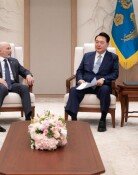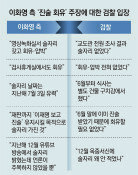N. Korea offers high interest rates on deposits to secure funds
N. Korea offers high interest rates on deposits to secure funds
Posted June. 03, 2016 07:43,
Updated June. 03, 2016 07:50
North Korea is encouraging its people to save money, offering high interest rates in an apparently desperate attempt to secure funds by attracting local money and foreign currencies its residents are keeping amid tougher international sanctions.
DPRK 360, a website specializing in North Korea, reported Thursday that a new North Korean bank had started business, guaranteeing up to 11 percent in interest rates. The website also released photos taken by Singaporean photographer Aram Pan, who had recently been to North Korea. The photos show that “Chinmyong Joint Bank” operated a booth at the Pyongyang Spring International Trade Fair, which opened on May 23, promoting its savings products offering interest rates of 2 percent on three-month deposits, 3 percent on six-month deposits and 7 percent on one-year deposits.
Compared with the South Korean benchmark rate of 1.5 percent a year, 7 percent is a very high rate. The booth also put up an advertising image and slogan reading, “Electronic savings cards, which can be used to make payments at home and abroad.” However, it did not explain how it would be possible for customers to make payments with credit cards issued by a North Korean bank subject to international sanctions. Some of the visitors to the website left comments expressing their curiosity, asking where the bank is located or whether they should open accounts at the bank.
Experts say it is almost impossible for a North Korean bank to offer such high interest rates at a time when the North Korean economy is contracting. Some argue that such high rates indicate the North is suffering from an extremely high inflation or could be a fraud. “Considering high demand for funds in North Korea, it might be possible for a North Korean bank to temporarily offer high interest rates by taking advantage of the loan-deposit margin,” said Cho Bong-hyeon, a senior researcher at Seoul’s private IBK Economic Research Institute. “However, it is hard to expect North Koreans to rush to the bank because of continuing inflation and their distrust in financial institutions and preference to dollars or commodity purchases.” In 2009, North Korea implemented a currency reform, depreciating its currency in order to prompt its people to take out their money kept in their closets, only to cause a financial chaos and end up in failure.
조숭호기자 shcho@donga.com







